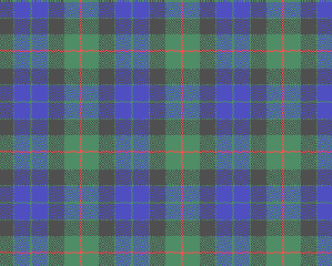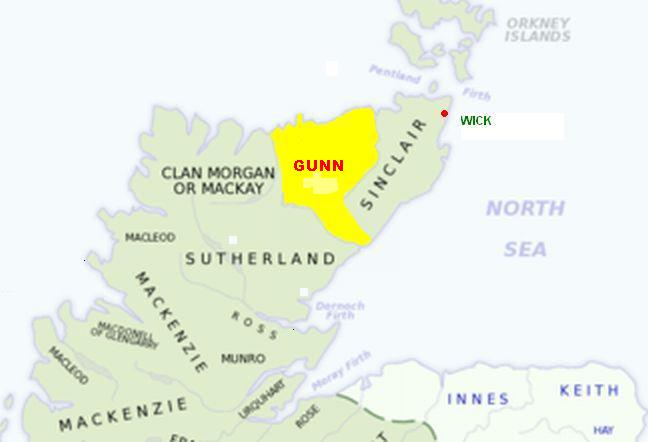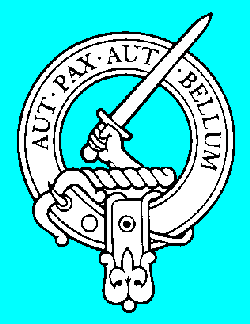

SURNAMES were introduced into Britain following the Norman Conquest in 1066 to clarify parish records. The name ‘Wilson’ was either a patronym - i.e. Son of William - or named after a location. For example, there are villages called 'Wilson' in Leicester and another in the county of Hereford & Worcester. The name first makes an appearance in England in the fourteenth century. There is a record of a Robert Wilson in the Wakeman rolls in Yorkshire in 1341. However, many Wilsons in Argyll and Bute, the lowlands of Scotland, Northern Ireland and the north of England belong to the sept of Clan Gunn and are of Scottish lineage.
 |
According to Thomas Sinclair (1890) the Gunns are descended from Gunnius, brother of the infamous Sweyn Asleifsson, the so-called "Ultimate Viking". Other historians say it was another Norse pirate, Gunnar, son of Olaf the Black, ruler of Orkney during the 13th century and grandson of Sweyn Asleifsson. Gunnar (Gunnarr in Old Norse) is a male first name of Nordic origin The name Gunnar means fighter, soldier and attacker, but mostly is referred to by the Viking saying which mean "Brave and Bold warrior" (fr. gunnr "war" and arr "warrior"). The clan is based in the town of Ulbster, a few miles south of present-day Wick an estuary town in Caithness. |
The Vikings weren't the first settlers there. Caithness has evidence of pre-historic occupation including several stone cairns and over 100 brochs. Many coastal castles - now in ruins - are Norse in origin. When the Viking settlers arrived here, somewhere around the 10th century, the land was inhabited by the Picts (the name "Pentland Firth" means "pict-land fjord"). Bands of settlers landed in the county, sailing over from Norway in their Viking longboats, gradually established themselves along the coast. Many placenames and not a few surnames are Norse in origin. For centuries, sovereignty over Caithness was disputed between Scotland and the Norwegian Earldom of Orkney. Around 1196, Earl Harald Maddadarsson agreed to pay tribute for Caithness to William I. Since the 'Treaty of Perth', 1266, Norway has recognized Caithness as Scottish .
In the 15th century the Gunns and the clan Keith were continually at war. The daughter of Lachlan Gunn was carried-off by a Keith to Ackergill where, rather than face dishon our, she threw herself from the top of a high tower. In 1426 the two clans fought a desperate but indecisive battle near Thurso. A similar engagement occurred in 1438 on the Muir of Tannach where the Gunns were defeated. Some twenty years later, in 1464, The two clans agreed a friendly settlement but the treacherous Keiths attacked the erstwhile friendly clan without warning and the Gunns were cut to pieces.
One story has it that to settle the feud once and for all a meeting was arranged in the chapel of St Tayr in Caithness. Each clan was allowed 12 horsemen. The dozen Gunns included the chief of the clan and several of his sons. At the appointed hour the Gunns entered the chapel and immediately started to pray in front of the altar. While the Gunns were at their devotions the Keiths arrived, led by the Laird of Inverugie and Aikregell. The Keiths also had their one dozen horses as agreed, but instead of one rider to each animal every horse carried two men. The Keiths stormed the chapel catching the praying Gunns unawares.
The Gunns, outnumbered two to one, were slain to a man. The Gunns fought long and hard but many of the Keiths were also slain in the vicious fighting. There was one survivor, James Gunn, a son of the clan chief, but only because he'd been unable to be at his father's side in the chapel. After the slaughter, James settled in Sutherland for safety. There he married and had a son.
It is from Henry Gunn that the Henderson clan of Caithness are descended. Sir William Gunn fought valiantly under Gustavus Adolphus King of Sweden (1611-1632). In 1636 on the Plains of Westlock, Charles I knighted William for his bravery when he was instrumental in defeating the Austrians.

In heraldic terms the Gunn crest is:
A‘ Right Forearm Holding a Sword in Bend all Proper.’
The Gunn plant-badge, is either juniper or a rose root;
motto: "Aut Pax Aut Bellum" Either peace or war.
The scattering of the clans, due in part to the Disarming Act and also due to the altered economic conditions of the time, was fostered by the Hanoverian government to put pressure on the clan chiefs already crushed by their devotion to the Stewart kings and their support for the Jacobite Rebellion. After 1745 large sections of land and estates were confiscated. Between 1763 and 1775 no fewer than 20,000 Highlanders, including the Gunns and Wilsons, found refuge in Ulster, England and America. Lured south across the border into England, many crofters were forced to sell their homelands to English sheep-farming speculators who, with the connivance of emigration agents, made vast fortunes depopulating the Highlands.
It is said that one Scottish family, descended from Will Gunn, emerged in Berwickshire, in south east Scotland. Will, following a minor conflict with the clan chief, moved his family - Will's sons - into Berwick on the southeast coast of Scotland. It is likely that these Wilsons ventured south taking their sheep and weaving skill into Yorkshire where a lucrative wool industry flourished in The Dales.
The Argyll Wilsons fought for William III (William of Orange) in the Battle of the Boyne (1690). William, known as King Billy, recruited many soldiers from Argyllshire, just across the sea from Ulster. Following the battle, many soldiers, including the Wilsons, settled down to farm in Ulster.
The earliest record I can find is of Joseph Wilson in 1791. My great-grandfather, John, my grandfather, Harry, and my father John Walter were born in Sheffield, Yorkshire. All three were 'little mesters', spring-knife cutlers. Recently I sent away for a DNA test. Find out how I got on. I do not know if these results show I am a Yorkshire Wilson of Danish decendant, or belong to a sept of clan Gunn.
There is another reason too. Is there a connection between multiple sclerosis and Scotland? The "Scottish Disease" as multiple sclerosis (MS)is called north of the Border, occurs more frequently in Scotland than in any other part of the world. A population study in the Lothian and Borders published in "The Journal of Neurology and Psychiatry" in 1998 indicated that twice as many people - 2 per 1,000 in Scotland as opposed to 1 per 1,000 in England and Wales - suffered from MS.
Read here the long list of famous artists, writers, scientists, doctors, actors, singers and musicians who over tbe years carried the name of Wilson. or visit the home page of Clan Gunn
| |
 |
|
| |
|
|